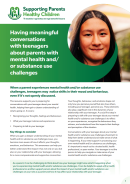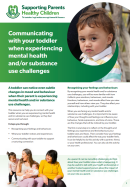You can now add Healthify as a preferred source on Google. Click here to see us when you search Google.
Self-care when a parent has a mental health condition
How to look after yourself when a parent has a mental health condition
Key points about self-care when a parent has a mental health condition
- Having a parent with a mental health condition, such as anxiety, depression or an addiction, can be challenging, particularly for young children.
- Even as an adult, if your parent has a mental health condition it can be confusing, stressful and isolating. It may be hard to understand why they’re acting the way they are.
- Here are some tips on how to manage, what you can do to help and how to look after yourself.

1. Be informed
Do some reading to learn about your parent’s mental health condition. This will help you understand their experience. You may want to find out:
- what their diagnosis is, if they have one
- what are their symptoms?
- what are their treatment options?
It might help to talk to other people who have gone through the same experience – they might be able to offer advice and support and make you feel less alone.
2. Be supportive
If you feel able to, let your parent know you're there to support them, to listen and talk. Offer to help them with things they might need. As well as emotional support, they may need help with practical things such as shopping or cleaning the house. You may want to offer to attend medical appointments with them.
3. Dealing with stigma and discrimination
Unfortunately, there’s still stigma around mental illness despite about 1 in 4 New Zealanders experiencing a mental health problem each year. If you feel embarrassed or ashamed about your parent’s condition then this is normal. However this may be because others don’t understand mental distress. You may be surprised that initial negative reactions pass once people find out more.
4. Make sure you have support yourself
Having a parent with a mental health condition can be exhausting so it’s important to look after yourself too. You may feel emotionally or physically exhausted. It may impact on your own mental health. Take time to do things you enjoy or that help you feel resilient (strong enough to cope). It might help for you to have someone to talk to about what you’re going through – this may be other family members or friends.

Image credit: Canva
5. Seek professional help
If you're dealing with a parent with a mental health condition or if you had a difficult childhood growing up with that parent, you may feel you need professional help. That’s okay, there are lots of organisations offering support and advice.
It’s also quite common for children of parents with mental problems to worry that they have a mental health condition like their parent, and there's support for this too.
The Mental Health Foundation has a free resource and information service(external link) that will point you in the right direction.
6. Get support if you need it
- The Mental Health Foundation has a comprehensive list of mental health support services(external link).
- Yellow Brick Road(external link) is an organisation dedicated to helping families living with mental health conditions.
- Free call or text 1737 to speak to or text with a trained counsellor.
Here are some things to know if you’re a young person and a parent, parental figure or guardian (eg, a grandparent or step-parent) has a mental health condition.
1. Your feelings are normal.
It’s ok to have many different feelings about what’s going on when you have a parent with a mental health problem. You may feel worried, angry, guilty or sad. Your thoughts and feelings are important and valid. You’re not being disloyal or selfish by having these feelings.
2. You’re not alone.
One in 4 people have problems with their mental health so there will be many other young people who have a parent with a mental health condition. Your, or your parent’s, healthcare provider, therapist or other support person may be able to put you in touch with other families with similar lives who you can connect with to share your experiences.
3. Don’t blame yourself.
Mental illness is no-one’s fault. You didn’t cause your parent’s mental health problem.
4. It’s not your responsibility to make things better.
Mental health problems can be treated in many ways. Medication and therapy are some of the common treatments. When managed well, your mum, dad or parent figure will be able to cope better with everyday life. Your parent and the adults supporting them are in charge of helping your parent with their recovery.
It might be that the best way you can help is by doing things such as your school work and keeping your room tidy. Or you might want to offer to do more around the house such as helping with chores or at mealtimes. Or there might be things your parent finds helps them – maybe you could draw them a picture, tell them or show them photos about your day, or give them a hug.
It's important to remember that when your parent is feeling unwell, they may not have the energy or patience to do everyday things with you and this is to do with their health, not to do with you or anything you have done.
5. Remember you’re a child not a parent.
Don’t put pressure on yourself to take on parenting responsibilities. Balance helping out your family with other things in your life.
6. Do the things you love doing.
It’s important to have time that’s just for you. You might like spending time alone listening to music or doing a hobby, hanging out with friends, spending time with your pets, or playing sport. Take time to do the things you enjoy.
7. Talk with people you trust and reach out for support.
You might want to have someone you can talk to about your fears and worries and anything else that’s going on. Support people could be close friends, family or whānau who know what’s going on in your family, as well as healthcare providers, teachers or a school counsellor.
You might want to talk to your parent if you can and if they’re willing – hearing their point of view can help you make sense of what’s going on. It’s a good idea to talk to them when they’re feeling well. Ask them what support they’re getting. This can help reassure you that they’re getting the help they need.
There are also free telephone helplines you can call to talk to people who are trained to help:
- Youthline 0800 376 633
- What’s Up 0800 942 8787 or text 5626 – for 5 to 18 year olds.
Video: Looking after you
Here's a video about how you can look after yourself if you have a parent with a mental illness.
(COPMI, Australia, 2015)
You can see other videos in this series for children of parents with mental illness on the COPMI YouTube channel(external link). The videos include topics such as “What is mental illness?”, “About getting better” and videos on the different types of mental illness such as depression, anxiety and bipolar disorder, that will help you understand what your parent may be experiencing.
How can I help my child?(external link) Supporting Parents, NZ
Connecting with your pēpi when you’re experiencing mental health and/or substance use challenges(external link) Supporting Parents, NZ
Communicating with your toddler when experiencing mental health and/or substance use challenges(external link) Supporting Parents, NZ
Having meaningful conversations with teenagers about parents with mental health and/or substance use challenges(external link) Supporting Parents, NZ
Parenting through challenging times(external link) Matua Raki, NZ
Living well(external link) Kina Trust, NZ
The best for me and my baby(external link) Children of Parents with a Mental Illness, Australia, 2014
Family talk(external link) Children of Parents with a Mental Illness, Australia, 2014
Note: Some of these resources are from overseas so some details may be different in New Zealand, eg, phone 111 for emergencies or, if it’s not an emergency, freephone Healthline 0800 611 116.
Family/whānau Tool-kit
Developed by MidCentral DHB in partnership with Supporting Families in Mental Illness, Manawatu
Supporting each other | Nurturing your child and yourself(external link) Supporting Parents Healthy Children
Source: Supporting Parents Healthy Children
Parenting through challenging times(external link) Matua Raki, NZ, 2021
Kids and young people(external link) COPMI Children of Parents with a Mental Illness, Australia
Brochures
Talking with teenagers about parental mental health issues(external link) Whāraurau and Supporting Parents Healthy Children, NZ, 2017
Discussing mental health and/or substance use challenges with your child(external link) Supporting Parents Healthy Children, NZ, 2017
Family talk – tips and information for families where a parent has a mental health problem or disorder(external link) COPMI, Australia, 2014
Apps
Mental health and wellbeing apps
Carer support apps
References
- Living well(external link) Kina Trust, NZ
- 25% of New Zealanders have poor mental wellbeing(external link) Mental Health Foundation, NZ, 2021
- Discussing mental health and/or substance use challenges with your child(external link) Supporting Parents Healthy Children, NZ, 2017
- Talking with teenagers about parental mental health issues(external link) Supporting Parents Healthy Children, NZ, 2017
- Parenting through challenging times(external link) Matua Raki, NZ, 2021
- Talking with your children about mental health and addiction issues(external link) Supporting Parents Healthy Children, NZ, 2017
- How can I help my child? – for parents who experience mental health issues(external link) Whāraurau and Supporting Parents Healthy Children, New Zealand, 2017
- Family talk(external link) COPMI – Children of Parents with a Mental Illness, Australia, 2014
Brochures

Having meaningful conversations with teenagers about parents with mental health and/or substance use challenges
Whāraurau and Supporting Parents Healthy Children, NZ, 2025

Communicating with your toddler when experiencing mental health and/or substance use challenges
Supporting Parents Healthy Children, NZ, 2025

Supporting each other | Nurturing your child and yourself
Supporting Parents Healthy Children
Credits: Healthify editorial team. Healthify is brought to you by Health Navigator Charitable Trust.
Reviewed by: Dr Sophie Ball, GP, Auckland
Last reviewed:





